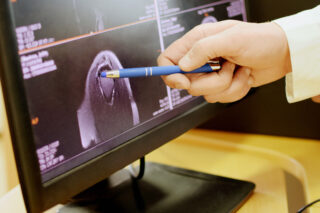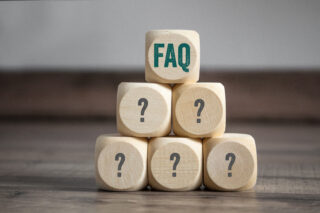AC joint instability
The acromioclavicular joint connect the clavicle to the scapula and is normally supported by several ligaments the AC joint ligaments and the coracoclavicular (CC) ligaments.
When moving the arm away from the body the AC joint undergoes movement. The joint is susceptible to injury and dislocation. This usually occurs by a fall onto the point of the shoulder. It is commonly injured in sports such as rugby skiing and cycling.
There are different grades of injury.
- Grade 1 ACJ ligaments are sprained
- Grade 2 ACJ ligaments disrupted but CC ligs intact
- Grade 3 ACJ ligs and CC ligs disrupted
This picture shows a patient with the typical deformity of a type III AC joint dislocation.
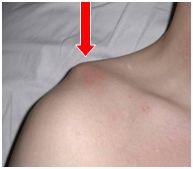
Symptoms
Symptoms of all injuries are local superior shoulder pain over the ACJ, deformity occurs with grade 2 and 3 injuries.
Treatment
Treatment of grade 1and 2 injuries is always conservative with a period of rest followed by physiotherapy. Occasionally ongoing ‘grumbling’ pain can occur in the ACJ, this is related to injury to the disc of cartilage which sits in the joint. Should this grumbling pain persist then an injection into the AC joint may be needed.
Treatment of type 3 injuries is more controversial, traditionally these have been managed without surgery. Studies have shown results with many patients having no ongoing symptoms. Surgery is reserved for patients who have ongoing problems with pain and instability.
Recently new techniques have evolved for acute fixation of type 3 dislocations. However as yet there are no direct comparisons between surgical and non surgical treatment to know which method of treatment is best.
The pictures below show a device being used to fix an acute type III dislocation this reduces the collar bone and holds it while the coracoclavicular ligaments heal.
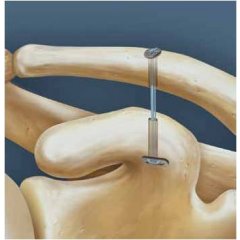
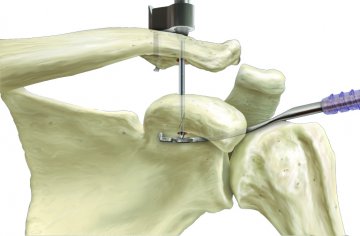
In patients with chronic type III injuries may complain of ongoing symptoms, such as
- localised pain over ACJ
- instability and crepitus
- weakness with aboove head high activity
There are many operations described for this problem, the principles to restore the joint and hold it in position. This can be done by ligament transfer ( Weaver Dunn procedure) this usually requires reinforcement of with additional fixation from clavicle to coroacoid.
Andrew Brooksbank

CONSULTING HOURS
CONTACT DETAILS
CONDITIONS
Treatment journey
APPOINTMENTS
Make a consultantion appointment wiith Mr Andrew Brooksbank at BMI Ross Hall Glasgow.
FAQ’s
Frequently asked questions about appointments, treatment, recovery and insurance/payments.
